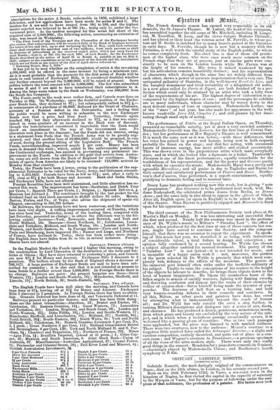The third concert of the New Philharmonic Society took place
at St. Martin's Hall on Monday. It was less interesting and successful than the first and second. Nearly half the evening was spent in the perform- ance of Dr. Wylde's music to Milton's " Paradise Lost "; the effect of which, when produced for the first time at one of these concerts last sea- son, might have served to convince the Society, and the composer himself, that there was no occasion to repeat the experiment. In speak- ing of this music last year, we described it as being, with indications of considerable talent, a total failure in design and conception ; an opinion fully confirmed by a second hearing. Dr. Wylde has chosen a subject altogether unfitted for musical treatment. The poetry of the " Paradise Lost " is not lyrical—it is not intended for music, and is incapable of a happy union with it : and, moreover, the portion of the poem selected by Dr. Wyldo is precisely that which most com- pletely bids defiance to the efforts of the musician. The genius of the immortal poet himself often sinks under the ineffable sublimity of his subject. Unable to raise the conceptions of his readers to the height of the objects he labours to describe, he brings those objects down to the level of human imagination. He likens the numberless hosts of the fallen angels to armies of earthly warriors, fighting with flaming swords, and throwing confusion and dismay into the ranks of their enemies by vollies of cannon-shot—Satan himself being made the inventor of gun- powder. The denizens of hell float on a burning lake, and hold very human-sounding debates in their councils and conclaves. In all this, Milton, as other poets and painters have done, has erred by attempting what is immeasurably beyond the reach of human art ; and Dr. Wyld has only carried the error a step further, in turning Milton's descriptions and dialogues into a series of airs, duets, and choruses. He has produced a dreary, ponderous, monotonous music, from which grace and beauty are excluded by the very nature of the sub- ject, and in which when a melodious passage occasionally occurs, it is welcomed like a passing gleam of sunshine. One or two such passages were applauded, but the piece was listened to with marked coldness. There were two overtures, new to the audience : Mozart's overture to a forgotten little musical farce called the Schauspiel Director,—a alight and careless composition, entirely theatrical, and quite out of place in a con- cert-room ; and Wagner's overture to Tannhauser,—a precious specimen of all the vices of the ultra modern style. There were only two really good things in the concert : Mendelssohn's pianoforte concerto in G minor, —charmingly played by Mademoiselle Clauss; and Beethoven's fourth symphony in B flat.


























 Previous page
Previous page